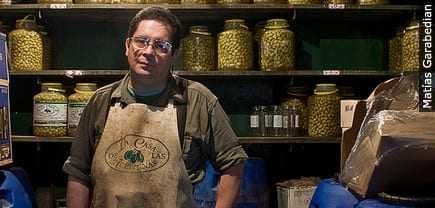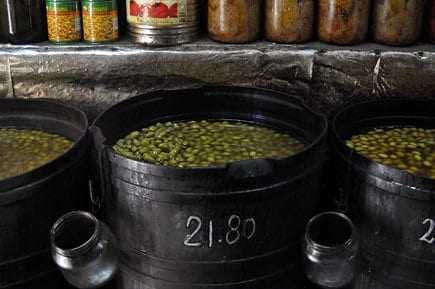
In the days before the modern supermarket adopted a one-size-fits-all approach to food distribution, consumers purchased their cheese, meat, vegetables and other goods from individual businesses specializing in one or two products at most. What they sacrificed in convenience by not having everything under one roof they gained in the quality of service and expertise they received at these smaller, family-run operations.
Situated on a sunny street corner in the historic neighborhood of Almagro in Buenos Aires, La Casa de Las Aceitunas (The Olive House) is one of those rare places that maintain the age-old tradition of the neighborhood shop, its identity inextricably tied to the past. Even in a city rife with nostalgia, where crumbling European-style haciendas offer constant reminders of its glory days, this unique locale is a dusty gem you’d be hard-pressed to find anywhere else.
Upon entering, the palpable aroma of fresh olives emanating from the dozen 40-gallon barrels that crowd the floor immediately draws you in. Dusty jars filled with pickled this and that line the shelves, from which old portraits of Argentine celebrities hang, modest testaments to the store’s local prestige. One shelf is dedicated entirely to olive oil, which is sold according to size in bottles bearing the family name.

Liliana Katsaounis represents the third generation and first female in a line of devoted owners at La Casa de Las Aceitunas, which has occupied the same building since its founding. Her great-uncle Constantino, a Greek immigrant who had sold Cointreau and wine in the old country, opened the store in August of 1958 and soon partnered up with Liliana’s father. Together they worked year in year out to establish a loyal clientele of olive lovers until their near-simultaneous deaths in 1995.
“At that time in ’58,” Liliana told us one morning before busy hours, “you had the central market of Abasto on Avenida Corrientes, and each business in the neighborhood specialized in certain products. You had places that sold cheese, olives, wine, anything really. In the case of my great-uncle, he decided to sell olives exclusively. And it stayed that way until my husband and I officially took over in 2000. We had to adapt to the times a little to fit changes in consumer habits and the economic realities in this country. That’s why we started selling kosher products.”
Almagro is home to one of the largest Jewish populations in Buenos Aires, and La Casa de Las Aceitunas happens to be one of the only places in the city where you can find the big, juicy black olives central to Israeli and Mediterranean cuisine.
“Our olives come from two main provinces in Argentina,” she explains. “80 percent come from Mendoza; these are the standard green olives we offer. The remaining 20 per cent are black olives from La Rioja province, where they flourish. This has to do with climatic differences between the two regions. It’s these black olives, called negras naturales, that attract so many Jewish consumers.” In addition, La Casa de Las Aceitunas imports hummus, tabbouleh, couscous and other regional products popular among this group.
Green olives, a ubiquitous pizza topping in a city of pizza addicts, are also big sellers, along with extra virgin olive oil. They form the heart of the business, says Liliana, and the Katsaounis have been buying them both from the same family-run olive vineyard in Mendoza since 1958. Both local pizzerias and neighborhood families purchase the products in bulk on a regular basis. Some particularly loyal customers have been coming each week to fill up their two-gallon jugs with olive oil for over twenty years.
“The oil we sell here is first press extra virgin; it’s so flavorful and pure because it’s not mixed with anything. You go to the supermarket and grab a bottle of olive oil and say ‘wow that’s so cheap,’ but you don’t read the fine print. Maybe it’s mixed with sunflower oil or other things you don’t want. Our oil is something special, though it does have its cost.”
Running a traditional business like La Casa de Las Aceitunas is not always a walk in the park, and a variety of factors have caused setbacks and challenges for the Katsaounis over the years, Liliana points out.
“One factor affecting the business is the high cost of importation because we sell a lot of imported products from the Mediterranean. Another factor has to do with climate change and man’s exploitation of the natural world. Near Mendoza, for example, they’ve built these mines in the glaciers, which affects the water quality and in turn the olive harvest. Maybe not today or tomorrow but the problem is there.”
Despite these setbacks, the owners of La Casa de Las Aceitunas have managed to maintain the store’s identity over the years and stick to what they do best. Liliana has tried to instill this commitment to tradition in her two sons, who will eventually take over the family business to become the fourth generation. Recently the Katsaounis purchased property around the corner, which will serve as the point of distribution for bulk orders.
“The spirit of the place is not going to change,” she says with certitude. “We can offer new products according to what customers want. But in terms of the structure and presentation of the place, let’s just say I’m conservative in the best sense of the word. When I close my eyes, I can still smell the aroma of my childhood. It brings back memories and reminds me of what we’ve fought to hold on to. Terrible things have happened in this country over the years but the store’s always been here. That’s really what it’s about.”








